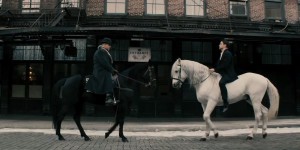Written and directed by Akiva Goldsman
USA, 2014
It’s interesting to consider how readily we accept the notion of true love at first sight in animated films instead of live-action ones. We more easily appreciate the Disney princess stories of our collective youth where a handsome prince stumbles upon a fair maiden and, in spite of various obstacles, the two connect at the end and live happily ever after. Fairy tales are inherently ridiculous and operate with a kind of dream logic, one that dulls like worn steel over time. As children’s stories, working with an almost deliberate illogic is appropriate; as stories for a wider, more adult audience, though, fairy tales sometimes feel like misbegotten folly. Winter’s Tale has more than a touch of the fantastical and whimsical, and though it is arguably a folly of some sorts, it’s a strangely fascinating one.
Colin Farrell plays Peter Lake, an Irish thief scrabbling his way through New York City in 1916, attempting to eke out a living and escape the clutches of his old boss, Pearly Soames (Russell Crowe), who’s got it in for him. One day, Peter is guided by his new companion/savior, a white horse, to the fancy house of one Beverly Penn (Jessica Brown Findlay), who’s suffering from consumption and has only months to live. The rest of her family has gone away on an extended vacation, and though Peter initially plans on robbing her house, they meet and instantly become enamored of one another. Of course, this isn’t just any love story; for example, Peter’s white horse is also prone to…flying around the city when need be. Oh, and Pearly appears to be a demon of some sort in consort with Lucifer himself.
There is much more to discuss about the sometimes baffling turns and twists in the plot of Winter’s Tale, but in some fashion, these are mysteries you should unlock for yourself. Winter’s Tale is, for better or worse, the kind of movie you not only should see, but should get your friends to see, if only so you can talk about it afterwards. Only then can you marvel at the random scenes, which are all marked by a winsome and earnest quality. Granted, writer/director Akiva Goldsman (working from the novel by Mark Helprin) hints quite clearly at the weirdness in store in the opening minutes: we see Peter’s birth parents leaving him in America while they’re forced to go back home for medical reasons, in 1895; and we also see a fairly normal-looking Peter exploring a meager living quarters at the top of Grand Central Station…in 2014. Something squirrelly is afoot, and it is, at least, far less normal than most romantic films tend to be.
This isn’t to say that Winter’s Tale is perfect. Like those fairy tales of old, this film operates with a dream logic, as the narration from Brown Findlay essentially encourages the audience to accept what happens without questioning it. Sometimes, as with the introduction and usage of Peter’s horse-cum-guardian angel, it works well enough; in some minor details, though, Goldman stumbles. One example: a character Peter encounters in the present day is an older version of someone he met in 1916. This woman (Eva Marie Saint) happens to be the editor-in-chief of a large New York-based newspaper. And she is apparently over 100 years old, a fact at which no one seems to bat an eye. We’re just meant to accept that she could be this spry and lively after more than a century of life, and move on. Frankly, most of the present-day sequence pushes the limits of acceptable implausibility to the breaking point. Again, some of the flights of fancy do work, to some degree; others, sadly, fall flat or are simply too illogical to believe.
Among the ensemble, the obvious high point—or low point, as this performance could very well enter the annals of memorably bad modern acting; your mileage will vary—is Russell Crowe as the heavy. (He does share scenes with, as an even more fearsome demon, a surprise guest star, whose identity will not be revealed here.) Crowe affects an Irish accent that hovers between being menacing and being reminiscent of the Lucky Charms leprechaun; Farrell’s, at least, is native. Crowe, though, is playing Pearly well over the top. It may not be his finest performance, but it’s weirdly compelling and funny. In the main story, Farrell and Brown Findlay have a sweet, if not sizzling, chemistry in their scenes together. However, because of the film’s structure, their time together is far too brief to be as impactful as is necessary.
This is, in effect, the biggest issue with Winter’s Tale: too frequently, it’s clear that Goldsman had to chop and slice the source material as best he could to make a 2-hour film. The finished product suffers from odd pacing and mild, at best, character development. No doubt, this is a flawed film, but there is something to be said for such a boldly strange film existing in the mainstream movie marketplace. Warner Bros. Pictures is taking a chance with this movie, and its imperfections almost make it more worthy of viewing. A film like Winter’s Tale is a rare mix of the supernatural, fairy-tale realism, and even a slight dash of evangelism. It may not be the obvious Valentine’s Day viewing decision, but you may be surprised by its rickety, messy charms.
— Josh Spiegel




